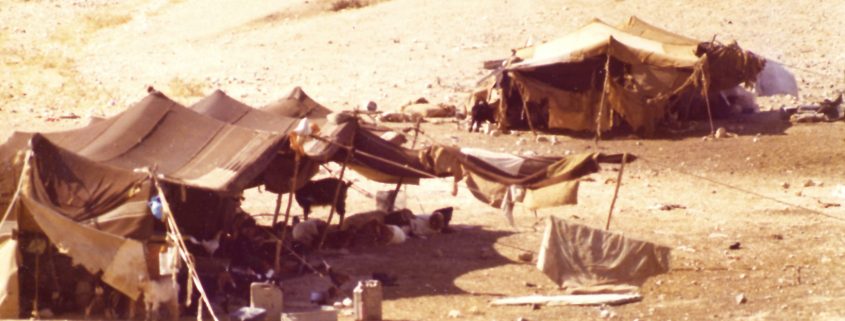Prior to Sir Leonard Woolley, scholars assumed that Abraham’s Ur was somewhere near Harran (which is the spelling outside the Bible). That’s about ten miles inside Turkey along the Balikh River, a tributary of the Euphrates that joins the great river at the Syrian city of Raqqa.
Harran was a merchant outpost in Abraham’s day, and it was perfectly situated for that role. It sat on a trade route from the Mediterranean to Sumer, linking the cities of Antioch and Carchemish with Nineveh, Babylon, and beyond.
This is consistent with what we know of Abram’s livelihood, who seems less like a shepherd and more like a traveling merchant who conducted business with men at the highest levels of government, as evidenced by his interactions with local kings in Canaan and the pharaoh in Egypt.
Harran is also the name of one of Abraham’s brothers. It’s probable that his brother was named for the city and not the other way around, since the city first appears among records recovered from the ancient city of Ebla dated to about 2300 B.C., some 300 years before Abraham.
The great scholar of Near Eastern history and ancient languages Cyrus H. Gordon made a strong case for Abraham’s origins along the upper Euphrates rather than in the heart of Sumer. Gordon, writing in the Journal of Near Eastern Studies in 1958,1 highlighted a then-recently translated Akkadian tablet from the ancient Canaanite city of Ugarit. A decree by the powerful Hittite king Hattusili III, who ruled in the mid-13th century B.C., to the king of Ugarit, Niqmepa, regulated the activity of Hittite merchants operating in Ugarit.
Important for our purposes: Hattusili identified the merchants as citizens of Ura, a city near Harran that specialized in tamkârûtum, or foreign trade.
Niqmepa had apparently complained to Hattusili about the traders from Ura. In response, Hattusili decreed that the merchants could conduct business in Ugarit only during the summer months (no great loss—that was the only time of the year when farmers had crops with which to pay); the merchants would have to return home to Ura in the winter; and they were barred from buying real estate in Ugarit.
Gordon pointed out that the Book of Genesis indicates that while Abraham and his descendants were in Canaan at God’s call, they were also there for the express purpose of conducting trade. For example:
But Hamor [king of Shechem] spoke with [Jacob and his sons], saying, “The soul of my son Shechem longs for your daughter. Please give her to him to be his wife. Make marriages with us. Give your daughters to us, and take our daughters for yourselves. You shall dwell with us, and the land shall be open to you. Dwell and trade in it, and get property in it.”Genesis 34:8-10 (ESV), emphasis added
Gordon observed that men who traded abroad, like Abraham, Isaac, and Jacob, apparently looked for opportunities to settle where they did business, but they were generally barred from buying real estate in foreign lands.
So there are enough similarities between the lifestyles of the patriarchs and the merchants of Ura, not to mention Ura’s proximity to Harran, to make the identification of Ura as Abraham’s Ur a strong possibility. Gordon went on in the article to demonstrate the linguistic possibility that the final vowel in Ura was dropped in the transition from Aramaic to Hebrew.
But just looking at the story logically, Harran was much too far north and east for Abraham’s father Terah to make it a stop on the way to Canaan if he’d been traveling from Sumerian Ur. There were much shorter routes between Sumer and Canaan—for example, a caravan route that linked Mari on the Euphrates to Damascus via Tadmor (Palmyra).
In other words, Mesopotamians in the 21st century B.C. would have mocked anyone from Sumerian Ur who tried to get to Canaan by way of Harran. Ending up at Harran would have required missing one turn completely and then taking another in the wrong direction, away from Canaan. Put it this way: Traveling to Canaan from Ur by way of Harran is like driving from Nashville to Kansas City by way of Minneapolis.
Finally, Woolley’s Ur was on the wrong side of the Euphrates.
Joshua gathered all the tribes of Israel to Shechem and summoned the elders, the heads, the judges, and the officers of Israel. And they presented themselves before God. And Joshua said to all the people, “Thus says the Lord, the God of Israel, ‘Long ago, your fathers lived beyond the Euphrates, Terah, the father of Abraham and of Nahor; and they served other gods. Then I took your father Abraham from beyond the River and led him through all the land of Canaan, and made his offspring many. I gave him Isaac.’”Joshua 24:2-3 (ESV), emphasis added
Ur in Sumer wasn’t on the other side of the Euphrates. It was on the west bank of the river, the same side as Canaan. But Ura, in modern-day Turkey, was, in fact, “beyond the River.”
“But what about those Chaldeans?” you ask. “Weren’t they around Babylon?” Glad you asked.
The Chaldeans were a Semitic tribe, possibly descendants of the Amorites, who founded the Neo-Babylonian empire in the first millennium B.C. That’s the Babylon of Nebuchadnezzar, not the Babylon of Hammurabi, who lived about 1,200 years earlier.
But the Greek historian Xenophon, who wrote in the 4th century B.C., referred to another group of Chaldeans. They were a warlike people who were neighbors of the Armenians. They lived north of Ura and Harran, between Mesopotamia and modern Armenia. In another book, Xenophon linked the Chaldeans to the Carduchians, who were probably the ancestors of the modern Kurds. The Kurds today occupy territory along the borders between Turkey, Syria, Iran, and Iraq, an area that includes the places we’re looking at, Harran and Ura.
Gordon also noted that greater Armenia, which was called Urartu from the time of David until the rise of the Neo-Babylonian empire, was in its earliest days known as Ḫaldi (the “ḫ” sounds like “k,” so it’s pronounced KALL-dee). In fact, the chief god of the Urartians was named Ḫaldi, father of the Urartian storm-god Teisheba (who was equated with Ba`al-Hadad).
So Ur of the Chaldees was probably Ura of the Ḫaldis. Abraham came from a border region located between the Hittites, the Hurrians, Semitic kingdoms such as Ebla and Mari, Amorite territory, and the Subartans (Assyrians), not from the heart of Sumer as we’ve been taught.
Understanding Abraham’s origins helps understand the early history of Israel. Why? Yahweh needed to give the future Israel time to develop its own identity. That wasn’t likely to happen with His people surrounded by the temptations of decadent urban life. Witness what happened to Abraham’s nephew, Lot, when he settled in Sodom.
Further, there is a cryptic comment God made to Abraham that is key to understanding the spiritual history of the world down to the present day.
And he said to him, “I am the LORD who brought you out from Ur of the Chaldeans to give you this land to possess.” But he said, “O Lord GOD, how am I to know that I shall possess it?”
He said to him, “Bring me a heifer three years old, a female goat three years old, a ram three years old, a turtledove, and a young pigeon.” And he brought him all these, cut them in half, and laid each half over against the other. But he did not cut the birds in half. And when birds of prey came down on the carcasses, Abram drove them away.
As the sun was going down, a deep sleep fell on Abram. And behold, dreadful and great darkness fell upon him. Then the LORD said to Abram, “Know for certain that your offspring will be sojourners in a land that is not theirs and will be servants there, and they will be afflicted for four hundred years. But I will bring judgment on the nation that they serve, and afterward they shall come out with great possessions. As for yourself, you shall go to your fathers in peace; you shall be buried in a good old age. And they shall come back here in the fourth generation, for the iniquity of the Amorites is not yet complete.”Genesis 15:7-16 (ESV)
Iniquity of the Amorites? Wait—what?
Patience. That’s for a future installment in this series.
1 Gordon, Cyrus H. “Abraham and the Merchants of Ura,” Journal of Near Eastern Studies 17:1 (1958), pp. 28-31.

Derek Gilbert Bio
Derek P. Gilbert hosts SkyWatchTV, a Christian television program that airs on several national networks, the long-running interview podcast A View from the Bunker, and co-hosts SciFriday, a weekly television program that analyzes science news with his wife, author Sharon K. Gilbert.
Before joining SkyWatchTV in 2015, his secular broadcasting career spanned more than 25 years with stops at radio stations in Philadelphia, Saint Louis, Little Rock, and suburban Chicago.
Derek is a Christian, a husband and a father. He’s been a regular speaker at Bible prophecy conferences in recent years. Derek’s most recent book is The Great Inception: Satan’s PSYOPs from Eden to Armageddon. He has also published the novels The God Conspiracy and Iron Dragons, and he’s a contributing author to the nonfiction anthologies God’s Ghostbusters, Blood on the Altar, I Predict: What 12 Global Experts Believe You Will See by 2025, and When Once We Were a Nation.





Leave a Reply
Want to join the discussion?Feel free to contribute!